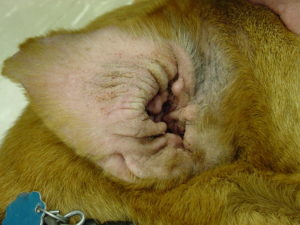‘Tis the season where we are starting to get outside more! While most pet owners are excited for their dogs to get out and about again, others are worried for their pet’s allergies to flare. There are three main categories of allergies in pets: flea, food, and environmental. There are ways to narrow down what your pet seems to be allergic to, and though we cannot cure allergies, we do have options to keep your pet comfortable.
Flea Allergies
 Flea Allergy Dermatitis appears in pets that have a hypersensitivity to flea bites. This is usually shown by itching, scaly skin, and hair loss usually on the lower back, tail head and inner thighs. The treatment for Flea Allergy Dermatitis is to clear your pet and their environment of fleas. Your pet should be on a flea preventative to prevent re-infection. If your pet has developed secondary infections, those should be treated by your veterinarian.
Flea Allergy Dermatitis appears in pets that have a hypersensitivity to flea bites. This is usually shown by itching, scaly skin, and hair loss usually on the lower back, tail head and inner thighs. The treatment for Flea Allergy Dermatitis is to clear your pet and their environment of fleas. Your pet should be on a flea preventative to prevent re-infection. If your pet has developed secondary infections, those should be treated by your veterinarian.
Food Allergies
Food allergies present themselves in pets with non-seasonal itchiness, skin and ear infections, vomiting and/or diarrhea. The most common food allergies are protein sources: chicken, beef or dairy – not grains. The best way to diagnose a food allergy is by doing a food trial. There a two ways to go about this. The first way is to try a novel protein; a protein source your pet hasn’t been exposed to such a salmon, venison, duck, rabbit, etc.
 The second way is to try a hydrolyzed protein diet; this is when proteins are broken down into small molecules that the immune system doesn’t recognize as allergens. To know if a food trial is working, the pet should be fed this diet exclusively for at least 8 weeks. This means excluding treats, table food and even flavored medication from their diet. If your pet does well on their food trial, they will most likely need to be on the novel or hydrolyzed protein diet for life.
The second way is to try a hydrolyzed protein diet; this is when proteins are broken down into small molecules that the immune system doesn’t recognize as allergens. To know if a food trial is working, the pet should be fed this diet exclusively for at least 8 weeks. This means excluding treats, table food and even flavored medication from their diet. If your pet does well on their food trial, they will most likely need to be on the novel or hydrolyzed protein diet for life.
Environmental Allergies

Environmental allergies naturally affect the part of your pet they come in contact with first – their skin. This includes increased scratching, licking paws and runny eyes. Pets can be allergic to many different environmental exposures: grass, trees, pollen, dander, perfumes, dust, cleaning products, etc. Luckily for us in North Dakota, some outdoor environmental allergies can be seasonal, while those that have household allergies can suffer year round. As these allergies can be hard to avoid, we have products to help our pets feel comfortable. Some pets with minor allergies may be able to get away with over-the-counter antihistamines such as Diphenhydramine (Benadryl) or Chlorpheniramine. Even though these medications are readily available, please contact your veterinarian for their advice and proper dosage prior to use. Pets with more severe allergies may require stronger medications to be prescribed by their veterinarian, such as the oral medications Atopica or Apoquel, or the injectable anti-itch medication Cytopoint.
As the season changes, keep an eye out to see if your pet exhibits any signs of allergies. If you feel that your pet would benefit from some allergy medications, please contact your veterinarian to decide on the best plan of action for your pet.
Article written by: Carly
